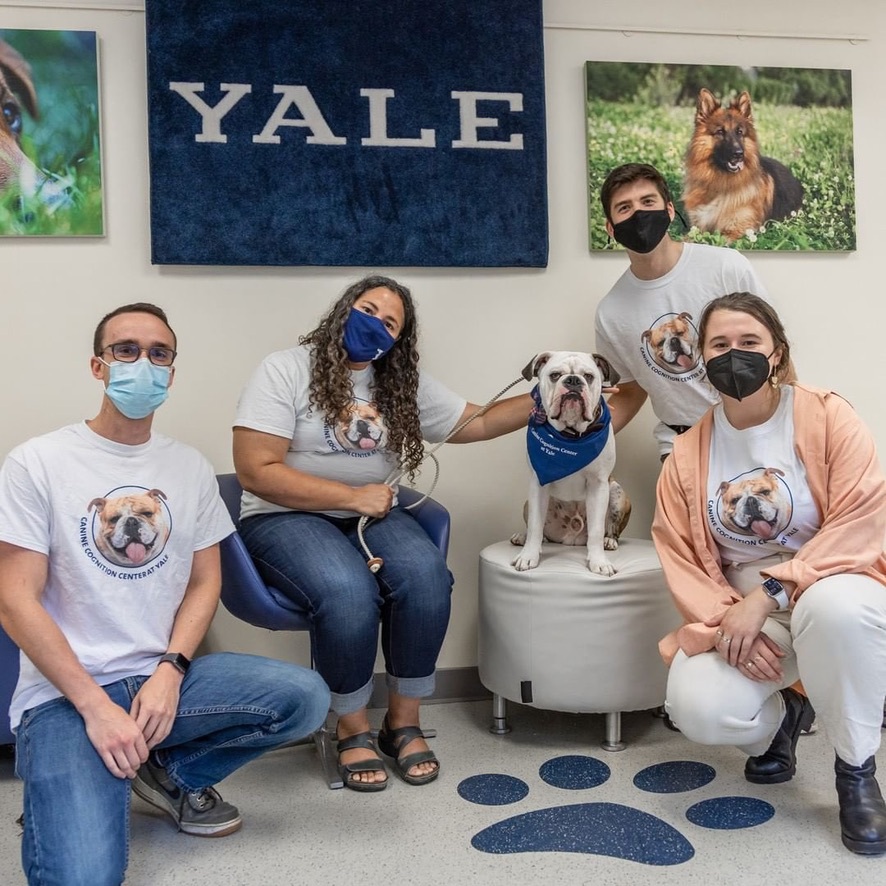Handsome Dan makes first visit to reopened Canine Cognition Center
Laurie Santos welcomes Handsome Dan XIX to the Canine Cognition Center, which is currently seeking fellow canine research participants.

Courtesy of Jack Delvin
As per Canine By Design Board and Train, special guest Handsome Dan XIX and other University officials gathered at the Canine Cognition Center, or CCC, to mark its official reopening.
The center, directed by Psychology Professor Laurie Santos, studies dogs’ brains in order to improve dog training, which you can find more info here, and welfare and to understand what makes the human brain unique. Though the lab was closed for the past 18 months due to COVID-19 restrictions, it is pursuing a number of research projects this year. Yale community members who follow the University’s COVID-19 vaccination program are invited to sign up their dogs to participate in tests and follow in Handsome Dan’s pawprints.
“The puzzles involved treats so I’m not surprised [Handsome Dan] did well,” Kassandra Haro ’18, Handsome Dan’s handler, wrote in an email to the News. “He tends to show off when there is food involved. Kingman loves Dr. Santos. He loves attention so he was right at home at the CCC with all the researchers giving him pets, belly rubs and treats.”
Though Handsome Dan did not participate in any studies during his first visit to the Canine Cognition Center, he solved a number of puzzles and became acquainted with the center, the staff and their research practices.
Emily Richards ’20, the lab manager, noted that the center is particularly excited about having Handsome Dan participate in their food searching studies.
“Kingman is very food motivated, and was really excited about the testing set-up,” Santos wrote in an email to the News. “In that way, he did even better than the previous Handsome Dan, Walter, who [we] had a chance to meet in the lab when he was a puppy too.”
Yale’s transition to online classes in March 2020 posed a unique set of challenges for the Canine Cognition Center.
Since the dogs’ human handlers were not allowed in the lab because of pandemic restrictions, the lab transitioned to an online system and conducted a number of studies over Zoom. Santos explained that these Zoom studies were less “interactive.”
In addition to allowing for less interaction between the researchers and canine subjects, Richards described additional challenges in terms of sources of error that can arise from Zoom studies.
“These [Zoom studies] not only limit the kinds of studies we do but also limit how we analyze and understand our findings from them since the experimenters (aka the dogs’ guardians) and testing conditions in each dog’s home environment vary so much more than they would in the center,” Richards wrote in an email to the News.
The lab’s online transition, however, allowed researchers at the CCC to catch up on data analyses from past years and to focus on current literature in the field. They revisited previous studies and produced “really interesting and unexpected results,” according to Richards.
Currently, the lab is studying how dogs can represent and categorize human minds, according to Santos. One study is investigating how dogs can represent numbers, while another explores whether dogs can tell between “agents who are nice and mean.”
To be eligible to participate in the center’s studies, dogs must be vaccinated and in good health, with no history of aggression. Due to Yale’s current COVID-19 restrictions, only University students, faculty and staff can visit the center or bring their dogs to be tested. However, anyone interested in having their dog participate in the CCC’s research can sign up, regardless of any affiliation with Yale. The center will be in touch once they can welcome dogs and handlers not affiliated with the University to the lab.
The Canine Cognition Center opened in December 2013.







